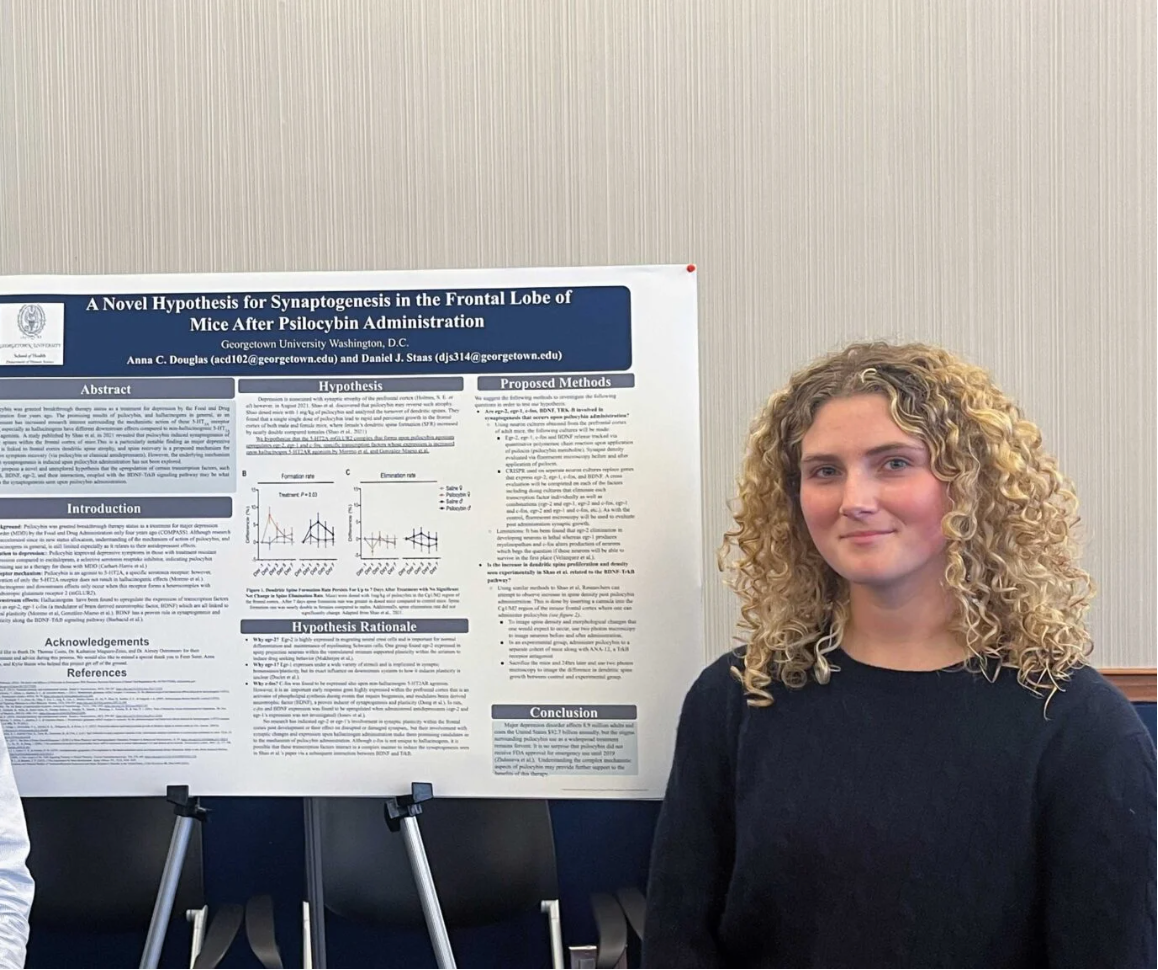Georgetown Neurobiology Major Blends Science and Art to Explore Mental Health
Anna Douglas (C’24) isn’t your typical neuroscience major. An accomplished artist and equestrian, Douglas has spent her time at Georgetown University forging a unique path that explores the complexities of mental health through both scientific and artistic lenses.
A Passion for the Brain Ignited
Douglas’ fascination with the brain began in high school after witnessing the impact of neurological disorders on loved ones. Determined to understand the mechanisms at play, she delved into research articles and textbooks. However, traditional science education left her yearning for more.
“It felt frustrating,” Douglas says. “I wanted to understand how the brain works, but existing explanations felt incomplete.”
An introductory neuroscience course provided the missing piece. It opened the door to a systematic exploration of brain structure and mental health, ultimately leading Douglas to pursue a neurobiology major at Georgetown.
Hands-On Learning in the Lab
Since 2022, Douglas has been actively involved in research at the Ostroumov Lab, investigating the mechanisms of neurological and neuropsychiatric disorders in rodents. This experience provided valuable hands-on learning, complementing her classroom studies.
“Being in the lab was incredibly rewarding,” says Douglas. “It allowed me to apply theoretical knowledge and witness the practical aspects of neuroscience research.”
Her research focused on Parkinson’s disease, the subject of her senior thesis. Additionally, she collaborated in the Vanmeter/Raven Lab at the Center for Functional MRI, exploring the link between brain iron levels and various psychiatric disorders.
“Anna’s dedication is truly exceptional,” says Alexey Ostroumov, an assistant professor in the Department of Pharmacology & Physiology. “Her contributions significantly advanced our Parkinson’s disease research, making her a valuable asset to the lab.”
Asking Poignant Questions in the Classroom
The Georgetown neurobiology department provided a stimulating environment where Douglas could explore her curiosity and ask critical questions. Professor Maguire-Zess’ class on synaptic transmission stands out as a prime example.
“Professor Maguire-Zess encouraged us to think critically,” Douglas says. “One assignment involved a literature review on a chosen topic related to synaptic transmission. My group selected psilocybin and depression, leading to a hypothesis on how it might treat depression and promote neurogenesis.”
This research culminated in presentations and a peer-reviewed publication, receiving recognition through the Provost Undergraduate Research Presentation Award. Douglas even presented the team’s findings at the National Collegiate Research Conference at Harvard University.
Artistic Exploration of the Mind
While delving into the science of mental health, Douglas found artistic expression offered a unique avenue for exploration. Under the guidance of photographer and installation artist Roberto Bocci, she channeled her neurobiology studies into thought-provoking artwork.
“My art explored themes of judgment, perception, and collective memory,” Douglas explains. “It partially reflected on my neurobiology research and the incredible support network I found at Georgetown.”
Her independent study with Bocci allowed her to create a series of portraits honoring those who had impacted her journey. These portraits were then printed on transparent film and used to construct sculptures and installations.
“I wanted to express my deep gratitude for the people who supported me,” Douglas says. “The installations served as a questioning of identity and the factors that shape it.”
A Holistic Education for the Whole Person
Douglas embodies Georgetown’s value of cura personalis, or education for the whole person. Beyond academics, she is an accomplished equestrian, a member of the United States Pony Club, and the recipient of a prestigious “A” rating in 2020.
Her passion for social impact led her to found I Sex Ed, Unfiltered, a free sex education program for high school students. Additionally, she established Hot Hoyas Walk, an athletic club attracting 400 members in its first semester, and volunteered as a counselor with the Crisis Text Line.
A Future Blending Science and Art
Inspired by her Georgetown experience, Douglas looks forward to continuing her exploration of mental health through a combined lens of science and art.
“Georgetown encourages students to forge their own paths,” says Douglas. “This instilled confidence and empowered me to pursue my passions in both art and science. This cross-pollination enriches all forms of inquiry, and I will undoubtedly carry that approach forward in my future endeavors.”
